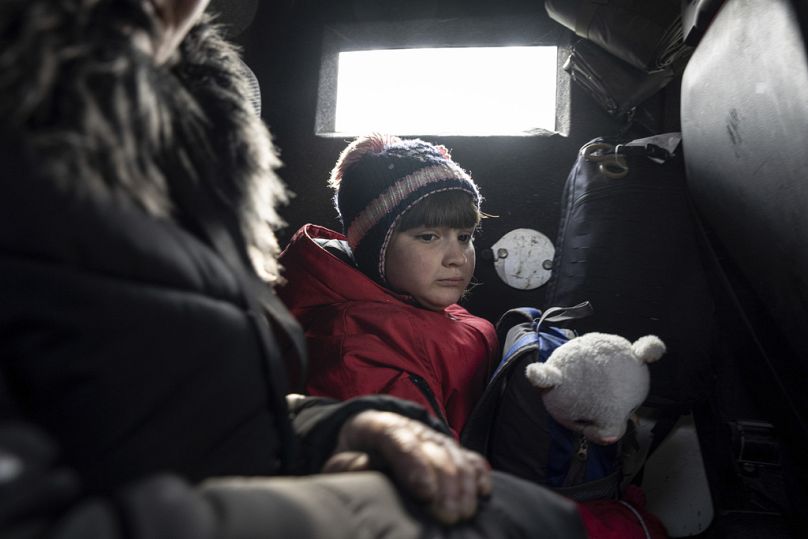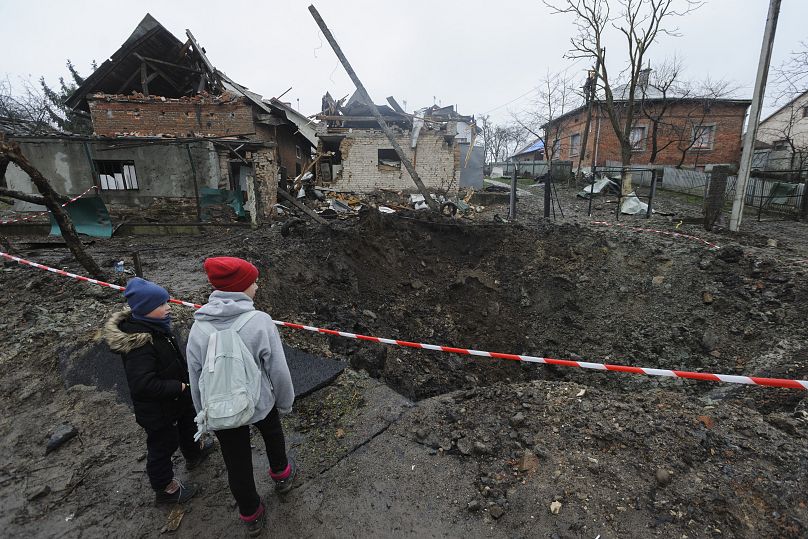NGO Save the Children says there is no aspect of Ukrainian children's lives that has not been affected since the full-scale invasion began in February 2022.
The number of child victims of the war in Ukraine surpassed 500 in April, according to UNICEF. Almost a thousand more children have been injured. It is also stressed that these are only confirmed figures and that the actual number of children killed could be much higher.
Most of those killed were in the Donetsk and Kharkiv regions of Ukraine, where there has been intense and prolonged fighting.
According to UNICEF, the cause of most of the deaths was the "use of explosive weapons", i.e. massive rocket, air and artillery attacks, mainly against populated areas.
A huge threat, as Sonia Kush, head of the Ukrainian branch of the NGO Save the Children, told Euronews, is mines and unexploded ordnance: 30% of the country's territory is mined.
"When we talk about 30% of the country being contaminated, it will probably take years to clear the landmines. So in the meantime, organisations like Save the Children do a lot of what we call mine risk awareness, which is working with children, their teachers and their parents and showing them examples of what landmines look like so they can avoid them, and how to act if they find themselves in a minefield."
Overwhelming needs
According to Save the Children, there is no aspect of Ukrainian children's lives that has not been affected since the full-scale invasion began in February 2022.
"Children need mental health support. They need support to deal with all the anxiety and emotions they feel because of the drastic and enormously changing conditions in the country. They need educational support. We know that after two years of COVID, there is now a third year where many children lost access to school or did not have a device to continue their education online," Sonia Kush told Euronews.
"They need good health care. We know that many clinics have been destroyed. Up to 700 were damaged in the attacks. Their parents need help to earn a living so that they have an income to take care of their children."
The danger of 'toxic stress'
According to Save the Children, in 2022 each Ukrainian child was forced to spend an average of 900 hours - more than 38 days - in shelters and safe houses.
The issue of psychological support is therefore one of the most important. Children who are victims of conflict, who have suffered physically themselves, or who have seen the death and suffering of their loved ones, children who find themselves in drastically changed conditions could actually "get used to" the situation and stop perceiving war, hostilities and violence in general as a mortal danger and as something bad and unacceptable.
"Unfortunately, one of the things we have learned from our work is that you have to address the mental health and psychological impact of conflict on children as the events unfold," explained Sonia.
"Because if you don't do that and you let trauma build up in children, it becomes what we call toxic stress. It's a clinical term that basically means that stress can build up in a child's body and affect them into adulthood. It can even affect them physically," she added.
Missing children
Hundreds of thousands of other children have been moved out of Ukraine, and not necessarily to the West. At least 730,000 Ukrainian minors have "arrived in Russia" since the full-scale invasion began, according to Russian data reported by the Russian Commissioner for Children's Rights, Maria Lvova-Belova, on 4 April.
The international community and Ukraine call it an "illegal transfer" of children. On 17 March, the International Criminal Court in The Hague issued arrest warrants for Russian President Vladimir Putin and Maria Lvova-Belova.
According to the ICC, the latter is "allegedly responsible for the war crime of illegal deportation of population (children) and the illegal transfer of population (children) from the occupied areas of Ukraine to the Russian Federation [...] The crimes were allegedly committed on occupied Ukrainian territory at least since 24 February 2022. There are reasonable grounds to believe that Ms Lvova-Belova bears individual criminal responsibility for the aforementioned crimes, having committed the acts directly, jointly with others and/or through others."
Moscow calls these children "refugees" and claims that most of them arrived with their parents or guardians. This is widely refuted internationally.













